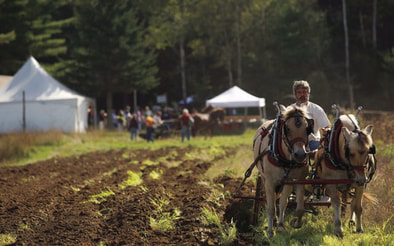
Probably everyone worried about climate change knows that approximately 50% of greenhouse gas emissions are due to our industrial agriculture system. Picture the huge tractors in the fields, the thousands of miles that semi-trailers travel getting food from the farms to the supermarkets, and the methane from the manure lagoons.
However, probably the most destructive thing (at least equal to the human health problems caused by processed food) has been the killing of the soil. The heavy use of of chemical fertilizers, poisons (pesticides and herbicides), the monoculture crops and GMO seeds is keeping the soil from being the carbon sink it used to be.
Small, family owned and operated, diverse, closed loop farms (all waste being recycled as compost used on the farm) are traditional throughout the world, and can still save our soil. At the 2014 Camden Conference on Food and Water, Fred Kirschenmann, a leader of the agro-ecology movement, said in his keynote address that “we must farm in harmony with nature. Nature always has livestock.” Manure does not have to be in a lagoon; it can be worked into the soil in a number of ways, from chickens to rain, where it enriches the soil. Vegetables can be varied, not monocultures, and rotated in the fields year to year, also enriching the soil. Grown in our dead soils, vegetables are offering less and less food value. Industrial food processing continues the assault on nutrition.
The Grange says that soil is the source of all wealth. This is true in a system that is focused on small farms, which actually already feed most of us, if you consider that most of the big farms are growing corn and soybeans, to feed animals that should be eating grass (a perennial in a properly managed meadow) or to turn into the quasi-food that is on most supermarket shelves. Remember, what our grandparents ate was just called food; now we have to call that organic food. The USDA has destroyed the meaning in organic by allowing more and more industrial practices, like hydroponics, to be called organic. The Organic Consumers Association has now given us a meaningful term: regenerative farming. Regenerative farmers feed the soil, which gives us our food. The Retberg’s farm has a motto: “All flesh is grass, all grass is soil.”
Find a regenerative farm near enough to where you live to buy real food. Be sure to talk to the farmer about their practices and philosophy. Gary Nabhan, the author of Food From the Radical Center: Healing Our Land and Communities has identified 167,000 farms and ranches already direct-marketing fresh and value-added foods in their own communities and more than 8,700 farmers markets and 7,400 CSAs (Community Supported Agriculture) farms in the US. They are enriching their soil and their communities, and have a high survival rate. They are the future of farming; even farmers in the farm belt are planning the change from monoculture to diversity and regeneration. (See Regeneration International) While you look for a farm, also look for a Grange; you don’t have to be farming to be a member, and community-building is important to them (except for some of the more traditionalists among them).
For a joyous and serious look at soil, see the film Symphony of the Soil, by Deborah Koons Garcia (yes, Jerry’s widow.)
As we work to build the one-on-one connections, between eaters and growers, cooks and food, farmers and soil, we build a local agriculture movement that has the strength both to resist the corporate model and the heart to bring even more people in to the table. As Phil notes, “In many places around the country, community food movements are flourishing despite the bureaucratic hurdles...” but for that good work to continue to spread, “we all need to row in turn.”

 RSS Feed
RSS Feed
